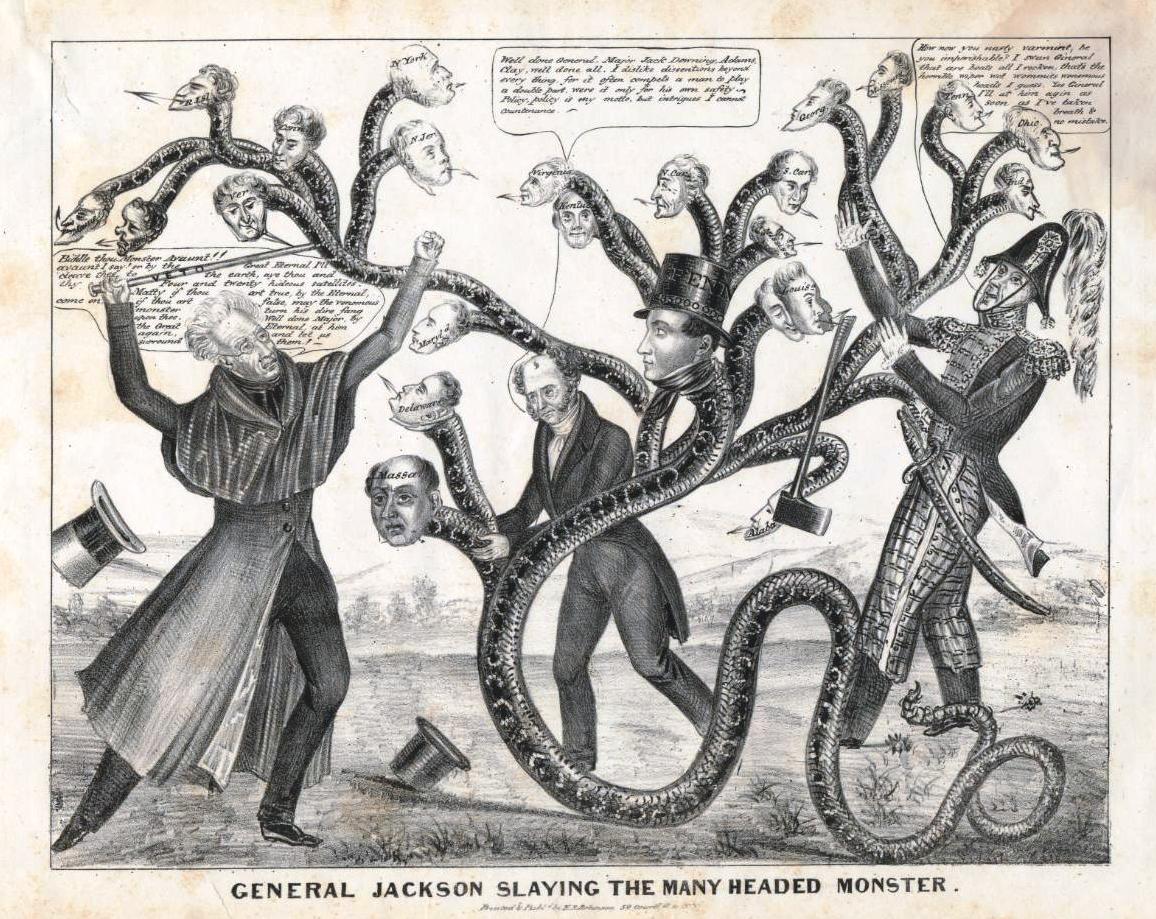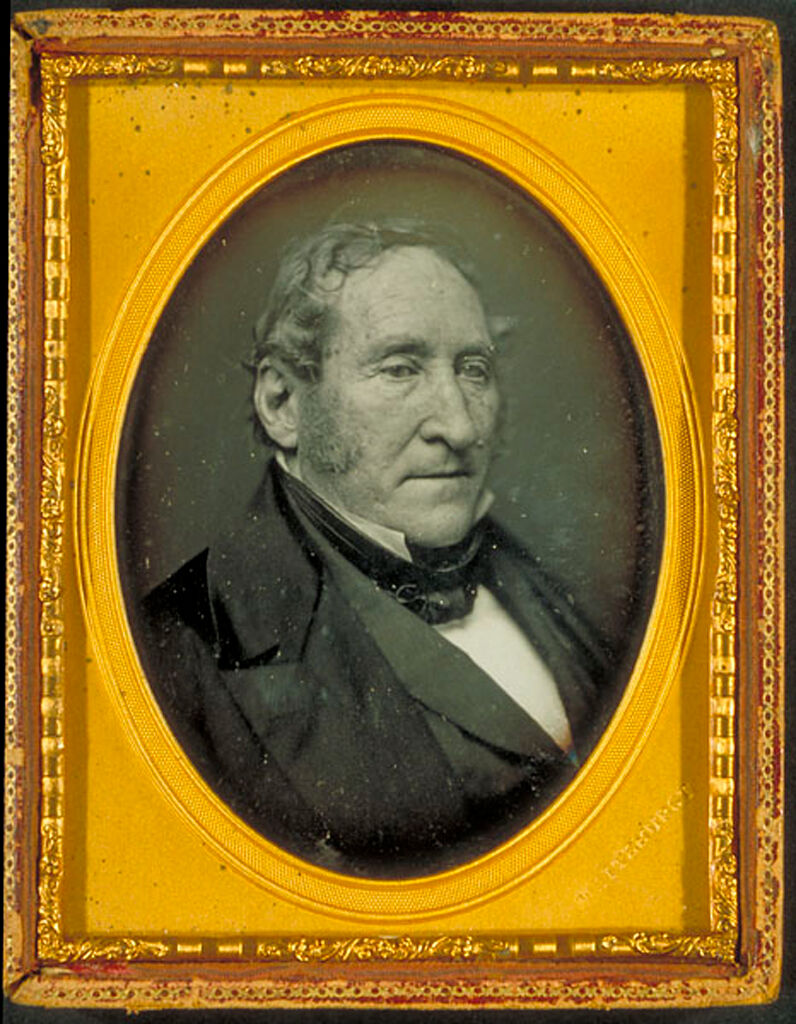|
Bloody Island (Mississippi River)
Bloody Island was a sandbar or "towhead" (river island) in the Mississippi River, opposite St. Louis, Missouri, which became densely wooded and a rendezvous for duelists because it was considered "neutral" and not under Missouri or Illinois control. History After its first appearance above water in 1798, its continuous growth menaced the harbor of St. Louis. In 1837 Capt. Robert E. Lee, of U.S. Army Engineers, devised and established a system of dikes and dams that washed out the western channel and ultimately joined the island to the Illinois shore. In 1846 as the Miami people were being forcibly removed westward from their traditional homelands; the group stopped on Bloody Island. According to Miami oral history, the group buried an infant and elderly member of the tribe on or near the island. The south end of the island is now under the Poplar Street Bridge at the site of a train yard. Samuel Wiggins bought around the island in the early 19th century and operated a ferry ... [...More Info...] [...Related Items...] OR: [Wikipedia] [Google] [Baidu] |
Mississippi River
The Mississippi River is the second-longest river and chief river of the second-largest drainage system in North America, second only to the Hudson Bay drainage system. From its traditional source of Lake Itasca in northern Minnesota, it flows generally south for to the Mississippi River Delta in the Gulf of Mexico. With its many tributaries, the Mississippi's watershed drains all or parts of 32 U.S. states and two Canadian provinces between the Rocky and Appalachian mountains. The main stem is entirely within the United States; the total drainage basin is , of which only about one percent is in Canada. The Mississippi ranks as the thirteenth-largest river by discharge in the world. The river either borders or passes through the states of Minnesota, Wisconsin, Iowa, Illinois, Missouri, Kentucky, Tennessee, Arkansas, Mississippi, and Louisiana. Native Americans have lived along the Mississippi River and its tributaries for thousands of years. Most were hunter-gathere ... [...More Info...] [...Related Items...] OR: [Wikipedia] [Google] [Baidu] |
Indian Removal
Indian removal was the United States government policy of forced displacement of self-governing tribes of Native Americans from their ancestral homelands in the eastern United States to lands west of the Mississippi Riverspecifically, to a designated Indian Territory (roughly, present-day Oklahoma). The Indian Removal Act, the key law which authorized the removal of Native tribes, was signed by Andrew Jackson in 1830. Although Jackson took a hard line on Indian removal, the law was enforced primarily during the Martin Van Buren administration. After the passage of the Indian Removal Act in 1830, approximately 60,000 members of the Cherokee, Muscogee (Creek), Seminole, Chickasaw, and Choctaw nations (including thousands of their black slaves) were forcibly removed from their ancestral homelands, with thousands dying during the Trail of Tears. Indian removal, a popular policy among incoming settlers, was a consequence of actions by European settlers in North America ... [...More Info...] [...Related Items...] OR: [Wikipedia] [Google] [Baidu] |
Nicholas Biddle (banker)
Nicholas Biddle (January 8, 1786February 27, 1844) was an American financier who served as the third and last president of the Second Bank of the United States (chartered 1816–1836). Throughout his life Biddle worked as an editor, diplomat, author, and politician who served in both houses of the Pennsylvania state legislature. He is best known as the chief opponent of Andrew Jackson in the Bank War. Born into the illustrious Biddle family of Philadelphia, young Nicholas worked for a number of prominent officials, including John Armstrong Jr. and James Monroe. In the Pennsylvania state legislature, he defended the utility of a national bank in the face of Jeffersonian criticisms. From 1823 to 1836, Biddle served as president of the Second Bank, during which time he exercised power over the nation's money supply and interest rates, seeking to prevent economic crises. With prodding from Henry Clay and the Bank's major stockholders, Biddle engineered a bill in Congress to rene ... [...More Info...] [...Related Items...] OR: [Wikipedia] [Google] [Baidu] |
Knife Fight
A knife fight is a violent physical confrontation between two or more combatants in which one or more participants is armed with a knife.MacYoung, Marc, ''Winning A Street Knife Fight'', (Digital format, 70 min.), Boulder, CO: Paladin Press, (January 1993) A knife fight is defined by the presence of a knife as a weapon and the violent intent of the combatants to kill or incapacitate each other; the participants may be completely untrained, self-taught, or trained in one or more formal or informal systems of knife fighting. Knife fights may involve the use of any type of knife, though certain knives, termed fighting knives, are purposely designed for such confrontations – the dagger being just one example. History Traditional schools During the long history of the knife as a weapon, many systems or schools of knife fighting have developed around the world. Each is usually distinguished by region and culture of their origin. In past centuries the repeated invasion and conquest ... [...More Info...] [...Related Items...] OR: [Wikipedia] [Google] [Baidu] |
James Madison
James Madison Jr. (March 16, 1751June 28, 1836) was an American statesman, diplomat, and Founding Father. He served as the fourth president of the United States from 1809 to 1817. Madison is hailed as the "Father of the Constitution" for his pivotal role in drafting and promoting the Constitution of the United States and the Bill of Rights. Madison was born into a prominent slave-owning planter family in Virginia. He served as a member of the Virginia House of Delegates and the Continental Congress during and after the American Revolutionary War. Unsatisfied with the weak national government established by the Articles of Confederation, he helped organize the Constitutional Convention, which produced a new constitution. Madison's Virginia Plan was the basis for the Convention's deliberations, and he was an influential voice at the convention. He became one of the leaders in the movement to ratify the Constitution, and joined Alexander Hamilton and John Jay in writi ... [...More Info...] [...Related Items...] OR: [Wikipedia] [Google] [Baidu] |
Louisiana Purchase
The Louisiana Purchase (french: Vente de la Louisiane, translation=Sale of Louisiana) was the acquisition of the territory of Louisiana by the United States from the French First Republic in 1803. In return for fifteen million dollars, or approximately eighteen dollars per square mile, the United States nominally acquired a total of in Middle America. However, France only controlled a small fraction of this area, most of which was inhabited by Native Americans; effectively, for the majority of the area, the United States bought the "preemptive" right to obtain "Indian" lands by treaty or by conquest, to the exclusion of other colonial powers. The Kingdom of France had controlled the Louisiana territory from 1699 until it was ceded to Spain in 1762. In 1800, Napoleon, the First Consul of the French Republic, regained ownership of Louisiana as part of a broader effort to re-establish a French colonial empire in North America. However, France's failure to suppress a revol ... [...More Info...] [...Related Items...] OR: [Wikipedia] [Google] [Baidu] |
William Rector
William is a male given name of Germanic origin.Hanks, Hardcastle and Hodges, ''Oxford Dictionary of First Names'', Oxford University Press, 2nd edition, , p. 276. It became very popular in the English language after the Norman conquest of England in 1066,All Things William"Meaning & Origin of the Name"/ref> and remained so throughout the Middle Ages and into the modern era. It is sometimes abbreviated "Wm." Shortened familiar versions in English include Will, Wills, Willy, Willie, Bill, and Billy. A common Irish form is Liam. Scottish diminutives include Wull, Willie or Wullie (as in Oor Wullie or the play ''Douglas''). Female forms are Willa, Willemina, Wilma and Wilhelmina. Etymology William is related to the given name ''Wilhelm'' (cf. Proto-Germanic ᚹᛁᛚᛃᚨᚺᛖᛚᛗᚨᛉ, ''*Wiljahelmaz'' > German ''Wilhelm'' and Old Norse ᚢᛁᛚᛋᛅᚼᛅᛚᛘᛅᛋ, ''Vilhjálmr''). By regular sound changes, the native, inherited English form of the name shoul ... [...More Info...] [...Related Items...] OR: [Wikipedia] [Google] [Baidu] |
David Barton (politician)
David Barton (December 14, 1783September 28, 1837) was one of the first U.S. senators from Missouri, serving 1821–1831. Barton was born near Greeneville, Tennessee, then part of North Carolina. He moved to St. Louis in 1809. In 1812, he joined Nathan Boone's company of mounted rangers. Later stints with the rangers helped to make Barton popular in the region. He became a major political presence in early Missouri, serving as attorney general, president of the state's constitutional convention, speaker of the Missouri territorial House of Representatives, and as one of its first pair of U.S. Senators. Barton County, Missouri is named for him. He was the brother of Joshua Barton, the first Missouri Secretary of State. David opposed the reappointment of William Rector to the Office of Surveyor General for Missouri, Illinois and Arkansas, saying that Rector was using his relatives for surveying positions and paying them too much while Rector was surveying the Louisiana Purchas ... [...More Info...] [...Related Items...] OR: [Wikipedia] [Google] [Baidu] |
Missouri Secretary Of State
The people below have served as the Secretary of State of the U.S. state of Missouri. List Gallery File:Warren E. Hearnes.jpg, Warren E. Hearnes File:James C. Kirkpatrick.jpg, James C. Kirkpatrick File:Rep Roy Blunt.jpg, Roy Blunt File:Mattblunt3 (cropped).jpg, Matt Blunt File:SOS Robin Carnahan.jpg, Robin Carnahan Robin Colleen Carnahan (born August 4, 1961) is an American businesswoman, lawyer, and politician, who previously served as the Missouri Secretary of State and currently serves as the Administrator of General Services in the Biden administra ... File:Jason Kander (cropped).jpg, Jason Kander References *'' Official Manual State of Missouri, 2005–2006.'' External linksOfficial homepage of the Missouri Secretary of State*Publications by or abouthe Missouri Secretary of State’s Officeat Internet Archive. {{Missouri year nav * 1820 establishments in Missouri Territory ... [...More Info...] [...Related Items...] OR: [Wikipedia] [Google] [Baidu] |
Code Duello
A code duello is a set of rules for a one-on-one combat, or duel. Codes duello regulate dueling and thus help prevent vendettas between families and other social factions. They ensure that non-violent means of reaching agreement be exhausted and that harm be reduced, both by limiting the terms of engagement and by providing medical care. Finally, they ensure that the proceedings have a number of witnesses. The witnesses could assure grieving members of factions of the fairness of the duel, and could help provide testimony if legal authorities become involved. From the Roman Empire to Middle Ages In Rome, the most famous duel was fought between three Horatii brothers and three Curiatii brothers, respecting precise rules during the 7th century BC. Marc Antony and Octavian also challenged each other to a duel which never came to fruition. The Lombards had dueling rituals too, often controlled by local judges. The Norse sagas give accounts of the rules of dueling in the Viking Age ... [...More Info...] [...Related Items...] OR: [Wikipedia] [Google] [Baidu] |
Thomas Hart Benton (politician)
Thomas Hart Benton (March 14, 1782April 10, 1858), nicknamed "Old Bullion", was a United States Senator from Missouri. A member of the Democratic Party, he was an architect and champion of westward expansion by the United States, a cause that became known as Manifest Destiny. Benton served in the Senate from 1821 to 1851, becoming the first member of that body to serve five terms. Benton was born in Harts Mill, Orange County, North Carolina. After graduating from the University of North Carolina, he established a law practice and plantation near Nashville, Tennessee. He served as an aide to General Andrew Jackson during the War of 1812 and settled in St. Louis, Missouri, after the war. Missouri became a state in 1821, and Benton won election as one of its inaugural pair of United States Senators. The Democratic-Republican Party fractured after 1824, and Benton became a Democratic leader in the Senate, serving as an important ally of President Jackson and President Martin Van ... [...More Info...] [...Related Items...] OR: [Wikipedia] [Google] [Baidu] |




.jpg)
